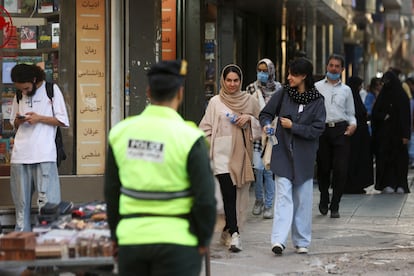Iran sentences unveiled women to jail, washing dead bodies in a cemetery and undergoing therapy
With two months to go to the anniversary of the start of anti-regime protests, authorities intensify their crackdown on Iranian women who disobey hijab law


On July 17, the court in Varamin in the Tehran province sentenced a woman to choose between jail or spending a month washing corpses — a ritual that includes the genitals and anal area — in Iran’s largest cemetery: Behesht-e Zahra. The “crime” that earned her this conviction was driving her car without wearing a veil, according to Iranian media in exile and activists who have circulated a copy of the verdict on social networks. Another court, also in Tehran, sentenced a medical doctor to clean the Interior Ministry for 270 hours on the same grounds a few days ago if she did not want to spend two months in prison.
Like these, other Iranian women who have dispensed with the hijab — obligatory from the age of nine — are being sentenced to prison or other, unusual punishments often accompanied by an order to undergo psychological therapy for an alleged “antisocial personality disorder” whose only “symptom” is not covering their hair. Last week, the Iranian website Vaklapress published another ruling by a third criminal court in Tehran defining not wearing the veil as “a contagious mental illness that causes sexual promiscuity.” The defendant was sentenced to two months in prison and ordered to pay for six months of psychological treatment.
This is Iran today and this is how the morality police arrested a teenager for not wearing a hijab. Mahsa Zhina Amini was taken away like this, then killed. Where are those journalists who excitedly reported the cancellation of those morality police? #WomanLifeFreedom pic.twitter.com/xndXlnnkSB
— Masih Alinejad 🏳️ (@AlinejadMasih) July 15, 2023
There are just two months to go before the September 16 anniversary of the start of anti-regime protests sparked by the death in police custody of a 22-year-old Kurdish woman — Mahsa Amini was arrested in Tehran by the morality police for wearing her veil incorrectly. The Iranian authorities are stepping up repression against the many women who no longer cover their hair. It is viewed as a gesture of civil disobedience that keeps demonstrations for change visible, and which the regime has harshly suppressed. At least 500 people have been killed by members of the security and paramilitary forces, according to Iranian NGOs in exile, and more than 22,000 detained. Seven men have been hanged in connection with the protests. One of them in public, using a crane.
The latest official move to force Iranian women to put the hijab back on came on July 16, when a police spokesman confirmed that the morality police had been redeployed on the streets to arrest hijab-less women, seven months after a regime official alluded to their alleged disappearance. It was an announcement Iranians greeted with disbelief. On July 15, a viral video on Iranian social media showed a terrified teenage girl screaming “help” as a female police officer tried to drag her into a police van.
A woman defying forced-hijab law ignores objections and chants from religious extremists in Iran, showing them the finger as she walks by. Women are continuing to protest the state's forced-hijab rule by not wearing them in the streets of Iran. pic.twitter.com/u2UrmHJ3Ka
— IranHumanRights.org (@ICHRI) July 12, 2023
Lawyer and women’s rights activist Shadi Sadr, co-founder of the NGO Justice for Iran, explains from her exile in London that the “main reason” for resuming the deployment of this police force is due to September 16. “With two months to go before the anniversary of Jina [Kurdish name for Mahsa] Amini’s death, the regime aims to avoid another wave of protests... They plan to achieve this by repressing women and instilling fear throughout the nation.”
This lawyer — sentenced in absentia in 2010 to six years in prison and 74 lashes for defending human rights in Iran — believes that her country’s regime “intends to convey to those who participated in the protests the message that, despite the deaths of more than 500 people, thousands of wounded, numerous arrests, forced disappearances and executions, their efforts have not been successful. Even the small achievement of being able to go out on the street without wearing hijab has now been crushed.”
Threats have been constant in recent months, recalls Sadr, who alludes to how “the attempt to intimidate women by identifying them with cameras on the street proved ineffective.” “Subsequently, they resorted to employing their [paramilitary] Basij or other plainclothes forces in the cities, who filmed women without hijab and reported them to the police. Now, as a last resort, they have redeployed the morality police,” she adds.
Public faces aren’t exempt from persecution
The Iranian regime’s strategy of branding unveiled women as mentally ill extends to cultural personalities. Two well-known actresses, Afsaneh Bayegan and Azadeh Samadi, have also been forced by the courts to undergo therapy to treat alleged “antisocial personality disorders.” The former has also been given a two-year suspended prison sentence, while the latter will not be allowed to use her social networks for the next six months, according to Iranian human rights organizations in exile.
Another actress, Leila Belukat, has been sentenced to ten months in prison, a two-year ban from working as an actress and a five-year ban from using social networks for disseminating a photo of herself wearing only a hat. Actor Mohammad Sadeghi was arrested at his home on July 16 for criticizing the return of the morality police during a live video broadcast. Iranian activists fear he will be accused of “promoting homosexuality” because he had painted fingernails in the images.
The modernity conveyed by the image of a man with nail polish in an Islamic society contrasts with the extreme conservatism of the Iranian regime. Political scientist exiled in the United States Saeid Golkar highlights the gulf between the “Islamist regime” and an “increasingly secularized” society in which a growing number of women are “willing to go out on the streets without hijab.”
“The Islamic Republic has already lost in its project to Islamize society and achieve an Islamist utopia. They [the regime] know that civil disobedience is going to continue, but they don’t care about the population; what they want is to satisfy the small social base that supports them,” Golkar says. With measures such as the deployment of the morality police, the political scientist asserts that they are trying to “take advantage of religious sentiment” and secure the support of their religious and conservative base. This comes at a time when Moharram (one of the sacred months of the Muslim calendar) has just begun and, at the end of July, the religious day of Achura will be observed. It is one of the most important in Shiism, the branch of Islam of the majority in Iran.
“Will they achieve their goal?” the expert asks rhetorically, “I think it will be very difficult for women to return to how things used to be.” Attorney Sadr concurs, “Brave Iranian women remain determined not to return to the state of affairs they refer to as ‘before Mahsa [Amini].’ Since the return of the morality police, many women have shared photos of themselves in public spaces without hijab, with a declaration: we will not go back.”
Sign up for our weekly newsletter to get more English-language news coverage from EL PAÍS USA Edition
Tu suscripción se está usando en otro dispositivo
¿Quieres añadir otro usuario a tu suscripción?
Si continúas leyendo en este dispositivo, no se podrá leer en el otro.
FlechaTu suscripción se está usando en otro dispositivo y solo puedes acceder a EL PAÍS desde un dispositivo a la vez.
Si quieres compartir tu cuenta, cambia tu suscripción a la modalidad Premium, así podrás añadir otro usuario. Cada uno accederá con su propia cuenta de email, lo que os permitirá personalizar vuestra experiencia en EL PAÍS.
¿Tienes una suscripción de empresa? Accede aquí para contratar más cuentas.
En el caso de no saber quién está usando tu cuenta, te recomendamos cambiar tu contraseña aquí.
Si decides continuar compartiendo tu cuenta, este mensaje se mostrará en tu dispositivo y en el de la otra persona que está usando tu cuenta de forma indefinida, afectando a tu experiencia de lectura. Puedes consultar aquí los términos y condiciones de la suscripción digital.








































